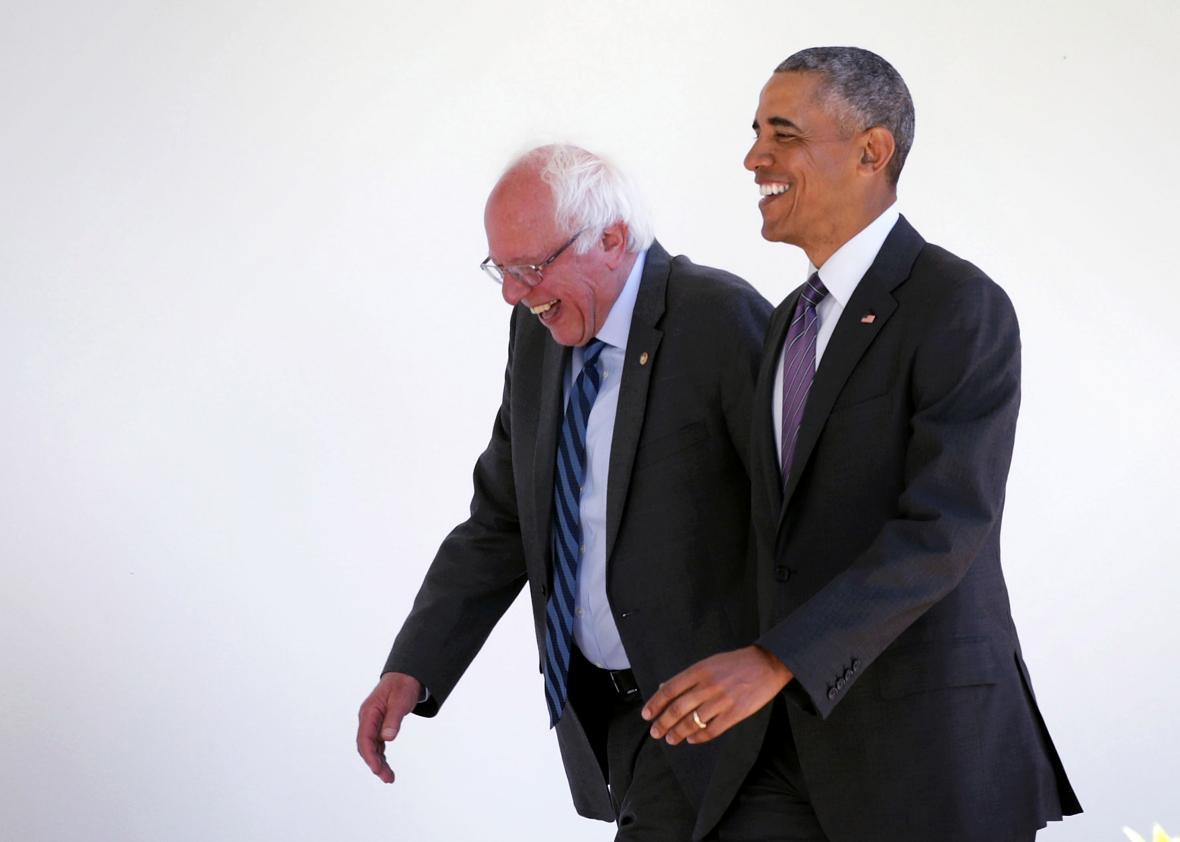In his endorsement of Hillary Clinton on Thursday, President Barack Obama explicitly compared today’s situation, with Bernie-or-Busters vowing to never vote for Clinton, to the aftermath of his own primary fight with Clinton in 2008. “I know some say these primaries have somehow left the Democratic Party more divided. Well, they said that eight years, ago as well,” he said. “But just like eight years ago, there are millions of Americans, not just Democrats, who’ve cast their ballots for the very first time. And a lot of that is thanks to Sen. Bernie Sanders…”
The implication is that Sanders supporters will ultimately help elect Clinton just like Clinton supporters helped elect Obama in 2008.
So is 2008 a useful comparison?
On the night Clinton lost the Democratic nomination to Barack Obama, she gave a defiant speech saying she had not made a decision to drop out. But despite her supporters chanting “Denver! Denver! Denver!” and booing Obama, Clinton never stated or implied that she would take the race to that convention. (A smile did creep across her face at that Denver chant, though.)
In contrast, Sanders’ Tuesday night promise to “take our fight” to the July Democratic National Convention in Philadelphia was interpreted by some of his voters as a pledge to contest the nomination in Pennsylvania. “It’s great to hear that he’s continuing to Philadelphia,” Margaret Alsop, 37, told me after the speech in Santa Monica. “He is [going to stage a floor fight] and he should.”
“It will be a contested convention. End of story,” Romy Ricart said even before the speech. “Bernie said it. …. I don’t think he will [change his mind]. He is that authentic.”
In 2008, Clinton ultimately withdrew from the race and endorsed Obama a few days after he sealed the deal. She campaigned vigorously for Obama and accepted a position as his secretary of state when he won. But there were a decent number of disappointed Clinton supporters who said they would never back Obama at the time. After Hillary’s non-concession speech in 2008, Slate’s Dahlia Lithwick observed that her supporters looked “sufficiently angry to set small brushfires.”
“I would die and slit my wrist before I’d vote for Obama,” one supporter told the Washington Post at the time. These self-described PUMAs—an acronym that stood for “Party Unity My Ass”—made up by some measures more than one-third of Clinton supporters. According to a Gallup poll taken at the end of March 2008, only 59 percent of Clinton supporters said they’d vote for Obama and 28 percent of them said they’d vote for John McCain. Likewise, a Washington Post survey from May of that year found 26 percent of Clinton supporters promising to vote McCain and only 64 percent promising to vote for Obama.
As the Post noted on Wednesday, though, “Obama’s support among Clinton primary supporters rose from 64 percent in May to 73 percent in mid-September, 79 percent in mid-October and 83 percent by Election Day, according to [a CNN] exit poll.”
The Post also noted that the challenge for Clinton might be more difficult than it was for Obama, because her favorability numbers are much lower than his were and because of the grassroots nature of Sanders’ campaign.
But overall, the number of voters she now has to win over are not dissimilar from those Obama did back then. A May survey by the Post had 70 percent of Sanders’ supporters saying they’d vote for Clinton and 20 percent saying they’d support Donald Trump, the latter number being an 11 percent increase from what it was in March.
Voters at Tuesday’s Sanders rally who roundly rejected even the thought of voting for Clinton were his most diehard fans, and thus probably the least likely to come around.
When I went to my neighborhood polling place in Los Angeles on Tuesday, I found ordinary Sanders voters much more likely to say they’d vote for Clinton in the fall.
“I’m going to vote for her, but I’m not excited about it,” said 30-year-old Samantha Gregory, who was casting a ballot for Sanders.
Adam Stonehouse, a 38-year-old bartender and a Sanders voter, said he would ultimately pull the lever for Clinton in November.
“Donald Trump can’t be president. He won’t, but if I didn’t vote that would be insane,” he said. “It makes me angry that that’s the alternative. … But you have to vote. You just have to.”
